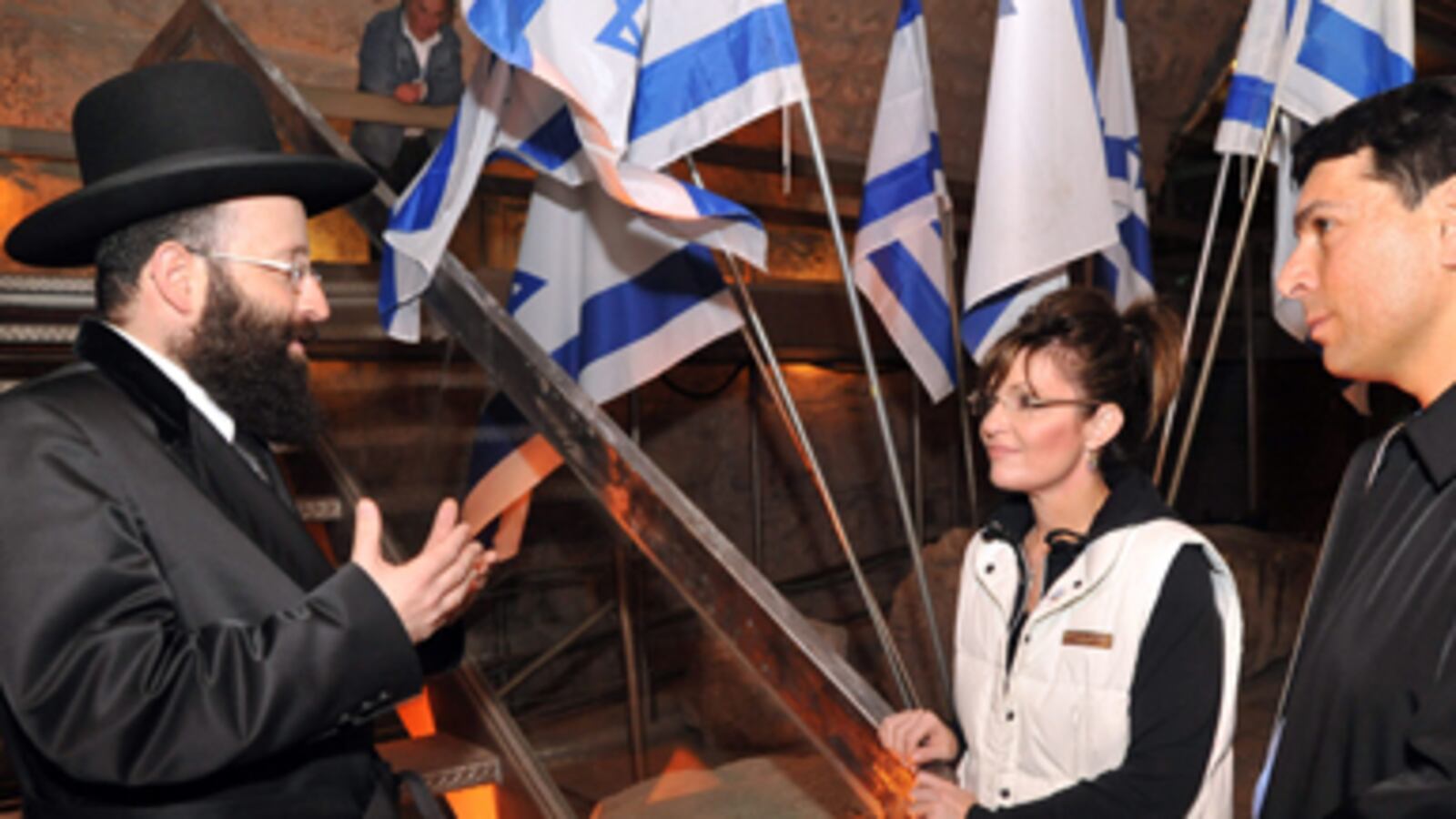Do American politicians pick up Jewish votes by visiting Israel?
Sarah Palin touched down here yesterday, the fourth would-be GOP candidate for president in the past three months alone to make what somfe commentators have started to call the Republican hajj. Wearing a large Star of David around her neck, Palin prayed at the Western Wall in Jerusalem, then spent two hours with guides in the Western Wall tunnel, an archeological site whose excavation in 1996 caused Palestinians to riot. “She was clearly excited about the holiness of the place,” Likud Knesset Member Danny Danon, who accompanied Palin, told the Daily Beast. “She wanted to touch the clay in the tunnel and then touch the water in the ritual bath.”

For the former Alaska governor, the trip offers a chance to distinguish herself as more pro-Israel than other American politicians and, perhaps, to make amends for her “ blood libel” gaffe in January that angered many Jews. Palin has already pointed out that President Obama has yet to visit Israel during more than two years in office. At a meeting with Prime Minister Benjamin Netanyahu, she was expected to distance herself from the position of some fellow Tea Partiers—chiefly Sen. Rand Paul—in favor of cutting aid to Israel.
But in the complicated arithmetic of vote-getting, the trip probably won’t help her with most American Jews should she run in 2012. To begin with, Jewish voters tend to be liberal. Nearly 80 percent of them cast their ballot for Democrats in every presidential election since 1992. (The McCain/Palin ticket got 22 percent of the Jewish vote in the 2008 presidential campaign, according to exit polls.) Even in the context of the Israeli political debate, most American Jews are more dovish than the current lineup of GOP favorites. Palin, for example, advocates the unrestricted expansion of Jewish settlements in the West Bank, in contrast to the longstanding American government view that settlements are obstacles to peace. Among American Jews, about 65 percent favor dismantling some or all of the settlements, according to polls.
So what draws Palin and others to Israel, including Mike Huckabee and Haley Barbour last month, and Mitt Romney in January? For one thing, a chance to curry favor with a much larger constituency that follows the events in Israel no less fervently than Jews: Christian evangelicals. The evangelical community in America numbers tens of millions and votes overwhelmingly Republican. One of its arms, a John Hagee group called Christians United for Israel (also known by its acronym CUFI), now claims to be the biggest pro-Israel organization in America, larger even than AIPAC.
Since Evangelicals tend to advocate the most hard-line positions for Israel—no compromise with the Palestinians and no withdrawal from any land God promised to the Jews—GOP candidates vie for their support with utterances that make even many Israelis uncomfortable. When Huckabee was in Israel last month, he visited a Jewish settlement and proclaimed there was no chance Palestinians would get their own state in the West Bank. Palin, albeit in a private moment Sunday, chastised Danon over Israel’s policy of barring Jews from praying on the grounds of the al Aqsa mosque, the site of the long-destroyed Jewish Second Temple. “She asked me, why are we being apologetic all the time?” he said.
“You don’t need the 70 percent of Americans who vote Democrat to support you,” Levin says. “You need a couple dozen of the right people to passionately believe you are their man.”
For Palin, of course, Israel also offers a chance to burnish her famously weak foreign policy credentials. Palin traveled to Israel from India, where she gave a paid speech and warned about the rise of China—a matter that is certainly important to Americans. But the issues that Israel embodies—grappling with terrorism, relations with the Arab world, the potential for conflict with Iran—are the most burning foreign policy questions candidates will be addressing in the run-up to the 2012 race.
“Showing up here gives them an opportunity to play in a harmless and safe way in the international arena while looking like globally savvy statesman,” says Charles Levine, who heads Lone Star Communications and has advised Huckabee and other American politicians on visits to Israel. That Israel is covered intensively by the American press is a bonus, he says. “When Al Gore visited while campaigning for president in 1991, he told me he got more publicity from two days in Israel than he would have gotten from pounding the pavement for weeks in the U.S.”
Finally, of course, there’s the matter of fundraising. Levine points out that while most Jews are liberal, many wealthy Jews support Republicans. With some of them, like the casino tycoon Sheldon Adelson or the bingo billionaire Irving Moskowitz, there’s no better way to make an impression than by having your photo taken with Netanyahu or touring the City of David—a settlement project bankrolled by right-wing Jews. “You don’t need the 70 percent of Americans who vote Democrat to support you,” Levin says. “You need a couple dozen of the right people to passionately believe you are their man.”
Dan Ephron has been Newsweek’s Jerusalem bureau chief since January, 2010. Previously, he served as a national security correspondent and deputy bureau chief for the magazine in Washington. His stories have also appeared in the Boston Globe, The New Republic and Esquire .






